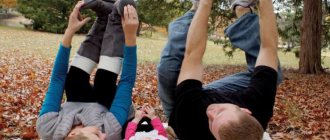Home / Children / Kids
Back
Published: 09/25/2021
0
2498
Some parents note that their baby sleeps on his stomach most of the night and worry that this position may have negative health effects. Such fears are justified, since in this position many natural processes are hampered, which can cause various disorders and poor health. Doctors note that compression of the chest and abdominal wall during sleep can cause respiratory arrest and digestive disorders in a weakened person.
- 1 The importance of posture in children during sleep
- 2 Choosing the right position for children
- 3 Advantages and disadvantages of sleeping on your stomach
- 4 When sleeping on your stomach is dangerous
- 5 Sudden death syndrome in a child
- 6 Recommendations from pediatrician Komarovsky
- 7 Top 5 tips for parents
The importance of posture in children during sleep
If you put a child to sleep and he turns on his stomach, having slept all night, then in the morning instead of being cheerful and in a good mood, he may feel tired and weak. In some cases, painful sensations may appear in different parts of the body, which aggravates poor health.
Doctors recommend falling asleep in a comfortable position, however, it is important that the spinal column forms a straight line. The best position in this case is on your side. At the same time, it is important to choose the right pillow so that kinks do not form in the cervical region, complicating the blood supply to the brain.
If the body position is not physiological, then the following processes become difficult:
- blood supply;
- intestinal motility;
- functioning of internal organs;
- Sometimes breathing may be depressed.
In this case, instead of proper rest, the body is forced to work harder to compensate for the load created by the incorrect position.
Safety rules for baby sleep
In the first months, parents must decide for themselves exactly how their baby will fall asleep. It is worth remembering that any position can be dangerous for the baby. If a child sleeps on his side, he may develop pelvic dysplasia. When sleeping on your back, there may be problems associated with improper development of the skull bones. Sleeping on your stomach, as noted above, leads to the danger of suffocation. These cases are rare, their probability is very low, but you still need to be careful.
Choosing the right position for children
The task of parents is to teach their children, taking into account their age, how to rest and what not to do under any circumstances. First of all, you should provide comfortable conditions for sleeping in the nursery, namely:
- The mattress should be of medium hardness. It is best to go with the orthopedic option.
- The pillow should be small in size; experts recommend choosing buckwheat husk as a filler - such an accessory helps you fall asleep faster, while maintaining the health of the cervical spine.
- For young children, you should purchase beds with small sides, since at this age the child can actively move in his sleep and fall on the floor.
- Before going to bed, it is recommended to ventilate and maintain the air temperature in the room within 18-200C.
- You should not put your child in a bed that is too soft and warm - overheating of the body and incorrect body position will not contribute to proper rest.
- It is recommended to use pajamas and bedding made from natural fabrics.
If your child likes to sleep turned to his side, it is best to place him on his left side. This will promote better functioning of the heart and digestive system.
Basic criteria for normal body position:
- The spine forms a straight line.
- Legs slightly bent. When lying on your side, you can place a small pillow between your knees, and when lying on your back, place it under the bend of the knee.
- In the chosen position, the spine is stretched in all its parts, natural curves are preserved, blood circulation is not hampered, and the body experiences pleasant relaxation.
Safe sleep rules
- The crib must meet safety standards. The child needs a firm mattress; bulky soft objects (large pillows, duvets) should be avoided in bed. Be sure to take out children's toys;
Important! Sheets and blankets must exactly match the size of the crib. Gaps between the children's mattress and the sides of the bed should be avoided. Pillows are not recommended for newborns at all.
- Infants under one year of age are at risk of sudden infant death syndrome (SIDS). The position lying on the stomach significantly increases it;
- The temperature in the baby's bedroom should be maintained at 20-22°C;
- During the first six months of life, it is better that the child is not at a long distance, but sleeps in the same room with his mother. At the same time, he must have his own crib. Sleeping in the parents' bed increases the risk of accidental suffocation, since there may be objects dangerous for the baby (pillows, blankets);
- You cannot smoke in the room where the baby sleeps. Exposure to cigarette smoke increases the risk of respiratory disease and reduces lung function;
- It is necessary to monitor the cleanliness of the baby’s nasal passages, promptly remove accumulated mucus and crusts;
- To avoid flattening of the head at the back of the head, do not overuse the position on your back. Sometimes you need to place your baby alternately on one side and the other. In this case, it is necessary to fix this position by placing a soft cushion and carefully monitor the child.
Advantages and disadvantages of sleeping on your stomach
The opinion of doctors regarding sleeping on the stomach is unanimous: constantly being in this position at night is dangerous to health. However, there are some advantages of such a holiday:
- With increased gas formation, pressure on the stomach will relieve intestinal colic and bloating.
- If there are problems with the kidneys, then this position will help optimize their functioning and improve the patient’s condition.
- For back pain, doctors sometimes recommend sleeping on your stomach for a while to relieve strain on overstrained muscles.
The harm from such a pose is immeasurably greater than the benefit. Consequences of sleeping on your stomach:
- Cerebrovascular accident. When lying on your stomach, your head inevitably turns to the side. This position causes compression of the vessels passing through the cervical spine and feeding the brain.
- Difficulty breathing due to compression of the chest. The lungs are not able to fully open, as a result of which gas exchange deteriorates; air rich in carbon dioxide stagnates in the alveoli. The quality of sleep is noticeably reduced, and it will take more time to recuperate. If a child has a tendency to apnea (stopping breathing), then the likelihood of suffocating in this position is high.
- Disruption of the urinary tract and reproductive function due to compression of internal organs.
- The risk of developing breast cancer in girls increases, since the growing mammary glands become deformed and stagnant processes develop in them.
- The likelihood of a stomach ulcer or gastritis increases due to the reflux of the contents of the duodenum. This can be prevented by abstaining from food 4 or 3 hours before going to bed.
- Pain in the cervical and thoracic spine due to incorrect and unnatural body position.
- Cosmetic defects in the form of sagging skin of the face and chest, the appearance of early wrinkles.
To place a child correctly, it is necessary to help him learn to find a position in which the body will function normally and the body will rest. A bent spinal column during sleep will deprive the muscles of relaxation, disrupt the normal blood supply to the tissues and cause ill health.
When sleeping on your stomach is dangerous
When a child turns over on his stomach in his sleep at one year of age and older, this does not pose any threat to his health. In some conditions, it is still better to refrain from such a position and carefully turn the sleeping person onto his side or back.
Not recommended sleeping positions:
- Cold, bronchitis or runny nose. With rhinitis, the nasal passages are clogged with mucus and normal breathing is disrupted. If we take into account that air begins to stagnate in the lungs due to compression of the chest, then we can assume a worsening of the condition due to the habit of lying on the stomach.
- Intestinal motility disorders, full stomach and other digestive system diseases can be aggravated due to insufficient blood supply at night.
- Diseases and curvatures of the spine are an absolute contraindication to sleeping on the stomach.
- Diseases of the cardiovascular system, especially in the presence of circulatory disorders, do not allow rest in this position.
Healthy children, as well as adults, are not recommended to sleep on their stomachs, since if such a position becomes permanent, pathologies cannot be avoided. At two or more years of age, children can be taught to sleep in the correct position. At the same time, falling asleep should not be accompanied by discomfort or negative emotions. You should not lift your child at night in order to turn him on his side or back. It is recommended to carefully turn the sleeping person to his left or right side, so as not to wake him up.
Sudden death syndrome in a child
It is noted that sudden infant death syndrome, which occurs in children under one year of age, is associated specifically with the position on the stomach during sleep. Therefore, pediatricians recommend keeping the child in this position while awake, since pressure on the abdomen facilitates the passage of gases. The habit of lying in this way has a beneficial effect on physical condition and promotes early physical development.
The exact cause of sudden infant mortality has not been established, but a direct link has been proven between sleeping on the stomach and the death of children. Most of the dead were in exactly this situation. It is believed that a soft mattress and pillows, colds and difficulty breathing through the nose significantly increase the risk of death from suffocation in children who are placed to sleep on their stomachs.
Important! At older ages, the likelihood of dying from sudden infant death syndrome is close to zero.
A 6 month old baby sleeps on his stomach
We are mothers and constantly worry about our children. No matter what happens every time, I will be able to find a problem that will make me suffer and beat myself up. For example, whether to put a child in a walker, I have already discussed this issue in detail in this post. That’s how we women are built, especially if this is your first child, you still don’t know anything and don’t understand at all what to do in this or that situation. Now my son is one year old and only now I was able to calm down and perceive various moments steadfastly and without unnecessary panic. This post is about sleeping on your stomach at 6 months.
When I weaned my son from swaddling, I already described in detail how it happened in this post. He began to roll over on his stomach while sleeping. It started at 5 months. One night I wake up, and he is sleeping on his stomach, with his nose buried in the mattress. There are no words to describe how I felt. I was very scared, I thought that he might suffocate. I started to wake him up, he woke up.
I remember that at that time this question tormented me for a very long time and I will honestly say that there is still no definite answer. Our specific problem was that our son, lying on his stomach, did not turn his head to the side, but by the age of 6 months a child should be able to do this. Pediatricians advised me to see a neurologist, but I’ll be honest, there were enough reasons to worry, and I didn’t drag my baby to the doctors.
But still, I decided to ask myself whether it is dangerous for a child to sleep on his stomach. Different doctors said different things. The local pediatrician stated that there is nothing wrong with a 6-month-old child sleeping on his stomach, but if he cannot turn his head to the side, it is better to play it safe and cover him with something at night so that he cannot turn on his stomach. There was a risk that he might suffocate. But when he already has this skill, let him sleep as he wants.
Another doctor said that it is not advisable for a child under one year to sleep on his stomach. Since there is such a thing as sudden infant death syndrome, and most often it occurs in babies in the first year of life. It is expressed in the fact that the baby suddenly stops breathing and, according to statistics, children who sleep on their stomachs have a higher risk of this syndrome than those who like to sleep on their backs. I didn’t know what to do; different specialists often answered my question differently whether it was dangerous for a child to sleep on his stomach.
To be fair, I note that many of my friends’ children at such a young age slept well on their stomachs. My problem was resolved quite simply. My son rolled over on his tummy a couple more times in his sleep, and then he stopped doing this altogether and this issue resolved itself. Now he is one year old and he likes to sleep on his stomach, but I no longer worry about this, since he is already big and turns his head to the side.
If your baby is sleeping on his stomach at 6 months, don't worry. Consult with different specialists. Only you can decide for yourself whether this sleep option is suitable or not. After all, if a mother constantly worries about the health of her baby, she will become nervous and irritable. Make a decision that will bring you peace and quiet.
Top 5 tips for parents
Pediatricians and psychologists recommend teaching children to fall asleep correctly from an early age. The first and main recommendations are as follows: maintaining a daily routine appropriate to age and ensuring physical activity while awake. Violation of the routine can turn the life of the entire family upside down and deprive the household of free time, proper rest, and turn the child into a twitchy and hysterical creature.
Five tips that, if followed, can improve your sleep quality and make it easier to fall asleep:
- The size of the bed should correspond to the age of the child; for younger children, sleeping furniture should have small sides to prevent falls.
- The pillow should not be too soft or large. Its task is not to raise the head, but to support the neck, ensuring its level position. It is ideal to use an orthopedic pillow.
- Blood circulation in the extremities should not be impaired: an arm or leg may become numb if they are bent or pressed with body weight.
- The head should not bend too close to the chest: in this case, the blood supply to the brain is disrupted, which negatively affects health. The problem can be solved by selecting a quality pillow and teaching the child to sleep correctly.
- In the evening, you should create an atmosphere conducive to rest, introduce rituals (bathing, reading fairy tales, quiet activities), after which children will eventually reflexively try to fall asleep.
The importance of correct body position while resting is no less important than good posture and proper seating at the table. It is very important for a growing body to get proper rest in order to develop well and maintain a healthy state. Providing a comfortable place for your child to sleep and creating a suitable environment is one of the important tasks of parents. At an older age, you should explain how to lie on the bed correctly and why it is important. Young children can be placed in the desired position.










